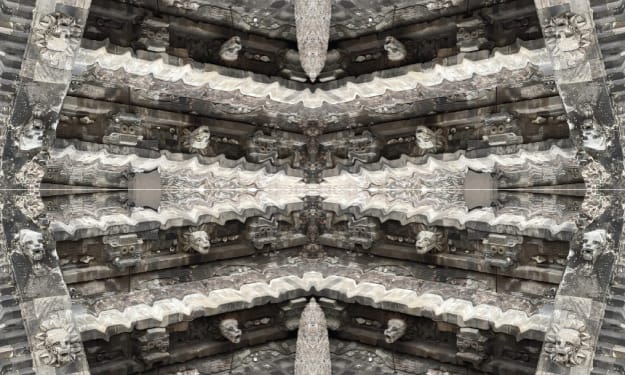
Why should love be measured by loss?
Between those two words - love, loss - bit on each side of them, is how all of this happens in the first place: the other word: desire.
When I can't have you, I desire you. I'm the kind of person who will miss a train or a plane just to meet you for a cup of coffee. I would take a taxi across town to meet you for ten minutes. I'll wait out all night if I think you'll open the door in the morning. If you call me and say, "Would you like to ......", my answer is "yes", before you finish your sentence. I weave a world where we can be together. I dream of you. For me, imagination and desire are very close.
Desire is often a creation. I mean, we are both reshaped by this powerful emotion. Well, sometimes it's the two of us, sometimes maybe it's just me, and at this point I'm your stalker, your psychopath, and I'm the one whose fantasies are out of control.
Craving for someone who has no desire for you can help you understand the nature of this extremely intense feeling; it has more to do with me than with you. You are the object of my desire. I am the subject. I am the me.
When we are the object of each other's desires, it is easy to understand that there is nothing negative in this pleasurable state. We become symbols of romance and we fulfill all the fantasies that are too romantic. This is what it was supposed to be like. You walk into a room ...... and our eyes meet ...... from this first moment ...... and so on.
It's perfectly safe to say that the irresistible desire for another human being contains quite a bit of projection. I don't believe in love at first sight, for reasons that will become clear later; but I do believe in "lust at first sight". Sometimes it's as simple as sexual desire, and perhaps men are more blunt about it, but usually desire is complex; a series of longings and needs, hopes and dreams, a whole universe of uninhabited stars searching for life.
And nothing feels more like life than desire. Everyone knows this; the blood pulses, not taking white powder but getting high like a doze. Desire is like a magical, trance-like ecstasy. When people often say "I would fall in love again - for the first month, six months, a year", they are not talking about love at all - they mean desire.
But who can blame us? The desire for you makes me feel strong and makes my body as sharp as a fox. The desire for you makes me live outside of ordinary time, calls me into a conversation with my soul that I don't think I've ever had before, entices me to behave better than ever, like someone else, someone good.
The desire for you filled my heart and thus became an exercise in clearing space. In this chaotic and crowded, swollen and noisy world, you became my meditation point. I thought about you and little else, and I realized how absurd and futile most of what I was doing was. The fragmented state of daily life finally became coherent. No longer scattered in time and space, I was gathered in one place, and that place was you.
Simple. Perfect.
Until something goes wrong.
The truth is: unless desire is transformed into love, desire will fail us; it will not do what it once did; those joys, those tremors. Our bouts of joy disappear. We no longer walk on air. We find ourselves back on the commuter train, standing on our own two feet. Words give this away; we say back to the ground [1].
For many people, this is a great disappointment. When desire disappears, so does love, and so does a romantic relationship. But I still doubt that love can change so easily. Reluctant to part, love gradually understands that the loved one is not Superman or Miss World.
We live in a culture of escalation. I think this infests romantic relationships. Why hold on to last year's model when the new model is shinier and more interesting? People, like things, are discarded in our society; we no longer mind job stability and we don't offer the security that comes with a romantic relationship. We make platitudes about keeping up with the times, as if we want to do something new age smart, when all we really want is to fix the girlfriend/boyfriend/husband/wife.
I don't want to go back to the 1950s, when couples stayed together no matter what, but who's to say that relationships like that were easy?
Advertising always promises new models that are easier to use. Of course, it's also easier when you "move up" to the next relationship - for a while.
If you're pretty or cute, handsome or rich, a series of relationships can be all desire and no commitment. As the sexual desire subsides, as the initial fantasy fades, we begin to see in real life that this other person is not our goddess or savior. We become fussy. We have doubts. We also begin to see ourselves, and since most of us have avoided facing ourselves throughout our lives, this sudden sighting is unpleasant, and we blame this other person so that we can run away.
It is much easier to change partners than to face yourself, but one of the many curious things about love is that it does ask us to face ourselves, when it gives us the strength of character that makes that difficult task possible. If desire is a magic potion that has an immediate effect (see Tristan and Isolde), love is a miracle whose effect only becomes apparent in time. Love is constant. And desire is in the here and now.
A culture of promotion, a culture of the here and now and a culture of celebrity, where the endless exchange of partners between rich and famous people is commonplace, and where permanence is not valued. We are the new Don Juan, our seduction needs to be faster and more frequent, and we hide these sins of the heart under the sexy headlines of desire.
Don Juan - famous for having a thousand and three women - was of course dragged to hell for his sins. Desire has never been loved by religion. Buddhism advocates clearing the mind, Christianity sees lust as the path to carnal sin and as a distraction from God. Islam requires women to cover themselves in public lest any man be irritated and endanger his soul. In the Jewish tradition, lust destroyed King David and Samson, as the contemporary Delilah [2] still tames their men. However, the love poem in the Bible called the Song of Solomon should not be omitted; it is as romantic as any love poem written since, and does justice to lust in the palace of love.... However, the love poem in the Bible called "Song of Solomon" should not be omitted; it is as ila
And quite rightly so. Desire is wonderful. The magic pill is sometimes exactly what is needed. You can love me and leave me as you wish, and anyone under thirty should experience much love and parting. I'm not saying that desire belongs to the young - it certainly doesn't - but when you're growing up, you have good reason to fall in love all the time, even if it's just to discover that it's not love at all.
The problem arises when desire is no longer about discovery, but simply a cheap way to avoid love.
It is not right to think of desire itself as the end. Lust itself is the end, and if that's all you want, then no problem. Desire is more subtle because I suspect its true function is toward love, not an excuse to go in another direction.
There is a scientifically based assertion that understands desire as a strategy of love, a love that is needed for social stability. Love is a way to bring people together, and desire is a way to make people love each other, so the argument goes. This theory reads our highest emotional value as species preservation. Not surprisingly, I abhor this reading; I prefer the poet's account. I believe Dante when he talks about love saying that it moves the sun and the stars. He did not know as much as we do about the construction of the firmament, but he knew the complexity of the mind.
My sense is that love is led by desire, and desire deepens into love, which is not just the selfish gene that makes society stable and the species survive. Loving someone is a shortcut that allows us to understand what it is like to be another human being. Love breaks through our habitual and stubborn selfishness, through the narrow, "me-first" that gradually closes us down, through the dead-end streets of loveless living.
There are different kinds of love, not all of which begin with desire, but desire occupies an influential place in our feelings. It unleashes a power that defies any kind of tradition and cuts across gender, age, class, religion, common sense and behavior.
It is exhilarating and necessary. It is addictive. Like all powerful substances, desire needs to be handled with care, and by its very nature it is almost impossible to do so.
Almost, but not always. Jung, starting from alchemy, speaks of desire as a white bird that should always be followed when it appears, but should not always be brought to the ground. Simply put, we cannot always act on our desires, nor should we, but suppressing them will get us nowhere. Following the white bird is a brave way to acknowledge that something explosive is happening. Maybe it will blow up our whole world, maybe it will detonate a chamber of the mind. For sure, things will change.
I don't think this white bird of desire is as enticing to most of us as a naturally euphoric substitute for white powder. Desire as a drug is more vulgar than desire as a messenger. Yet most things in life have a practical meaning and a poetic meaning, and there are times when only poetry can respond.
For me, when I trust my desires, whether I act on them or not, life always becomes much more difficult, yet strangely illuminated. When I don't trust my desires, whether out of cowardice or common sense, I slowly move into the shadows. I can't explain this, but I have found it to be true.
Desire deserves respect. It deserves to be on those strife. But it is not love, and only love deserves to be on everything.
About the Creator
Enjoyed the story? Support the Creator.
Subscribe for free to receive all their stories in your feed. You could also pledge your support or give them a one-off tip, letting them know you appreciate their work.






Comments
There are no comments for this story
Be the first to respond and start the conversation.